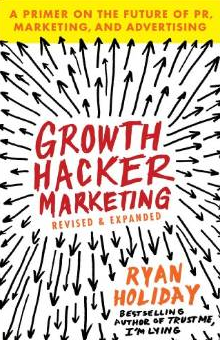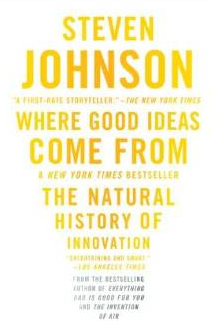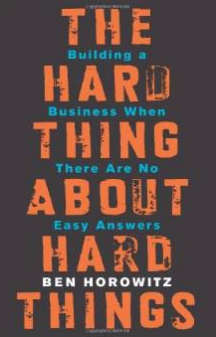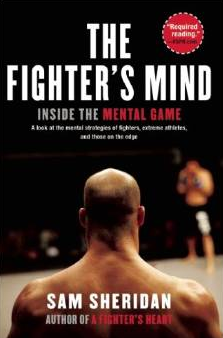 I recently read “Growth Hacker Marketing: A Primer On The Future of PR, Marketing, And Advertising” by Ryan Holiday. Below are the quotes I found most interesting. If you like these quotes, buy the book here.
I recently read “Growth Hacker Marketing: A Primer On The Future of PR, Marketing, And Advertising” by Ryan Holiday. Below are the quotes I found most interesting. If you like these quotes, buy the book here.
“I think anyone marketing or launching fantasizes that they are premiering a blockbuster movie. And this illusion shapes and warps every marketing decision we make.” (xix)
“Our delusion is that we should be Transformers and not The Blair Witch Project.” (xix)
“The best marketing decision you can make is to have a product or business that fulfills a real and compelling need for a real and defined group of people.” (2)
“The books that tend to flop upon release are those where the author goes into a cave for a year to write it, then hands it off to the publisher for release. They hope for a hit that rarely comes.” (7)
“They test the ideas they’re writing about in the book on their blog and when they speak in front of groups. They ask readers what they’d like to see in the book. They judge topic ideas by how many comments a given post generates, by how many Facebook “shares” an article gets. They put potential title and cover ideas up online to test and receive feedback.” (8)
“Phil Libin said, “People thinking about things other than making the best product, never make the best product.”” (10)
“Once we stop thinking of the products we market as static – that our job as marketers is to simply work with what we’ve got instead of working on and improving what we’ve got – the whole game changes.” (11)
“Brian Halligan says, “you must match the way you market your products with the way your prospects learn about and shop for your products.”” (15)
“All of these types of outreach are done with a very specific mindset, with a very specific goal. We are not “spreading the word”; we’re not throwing up a billboard in Times Square and hoping in six months someone will spot our product in a grocery store and decide to pick it up. Instead, we are intensely focused on driving an initial set of new user sign-ups and customers, right now.” (26)
“It doesn’t matter how many people know about you or how they find out about you. It matters how many sign up.” (26)
“Patrick Vlaskovits puts it: “Focusing on customer acquisition over ‘awareness’ takes discipline… At a certain scale, awareness/brand building makes sense. But for the first year or two it’s a total waste of money.” (28)
“Users have to be pulled in. A good idea is not enough. Your customers, in fact, have to be “acquired.” But the way to do that isn’t with a bombardment. It’s with a targeted offensive in the right places aimed at the right people.” (28)
“The good news is that we have to do that only once. Because the next step isn’t about getting more attention or publicity. The endless promotional cycle of traditional marketing is not our destiny. Because once we bring our first customers in, our next move is to set about turning them into an army.” (29)
“Only a specific type of product or business or piece of content will go viral – it not only has to be worth spreading, it has to provoke a desire in people to spread it. Until you have accomplished that, or until your client is doing something truly remarkable, it just isn’t going to happen.” (32)
“Virality at its core is asking someone to spend their social capital recommending or linking or posting about you for free. You’re saying: Post about me on Facebook. Tell your friends to watch my video. Invite your business contacts to use this service. The best way to get people to do this enormous favor for you? Make it seem like it isn’t a favor. Make it the kind of thing that is worth spreading and, of course, conducive to spreading.” (33)
“You should not just encourage sharing but create powerful incentives to do so.” (34)
“You can’t just make a YouTube video about whatever you want and expect it to get ten million views. There has to be a compelling reason for a community to take hold of it and pass it around. You can’t just epxect your users to become evangelists of your product – you’ve got to provide the incentives and the platform for them to do so. Virality is not an accident. It is engineered.” (40)
“In an effort to improve the site’s aesthetic appeal and attract higher-end customers, Airbnb began offering free professional photography for its listings. If you listed your house on the service, they’d send a pro over to take amazing photos that made your house look irresistible.” (47)
“What growth hackers have mastered is the ability to grow and expand their businesses without having to chase down new customers.” (49)
“The probability of selling to an existing customer is 60 to 70 percent, while a new prospect it’s just 5 to 20 percent.” (55)
“Tim took Product Market Fit to the next level – designed each chapter to stand alone on its own merits and made specifically for a defined community and group of readers.” (59)
“When your product is actually relevant and designed for a specific audience, bloggers love to write about you. Writing articles about you means more pageviews (and advertising revenue) for them!” (60)
“If you’re planning to launch a business in a few months or a few years, start building your platform – and your network – today.” (61)
“Marketing, too many people forget, is not an end unto itself. It is simply getting customers. And by the transitive property, anything that gets customers is marketing.” (66)
“You’ve got to build a list, because a list is the easiest and most effective marketing tool, period.” (76)
“If people are coming to your site and only a small percentage “stay,” the answer is never, I repeat, never, to try to get high volumes of traffic.” (81)
Liked the quotes? Click here to buy the book.





